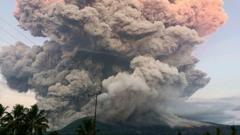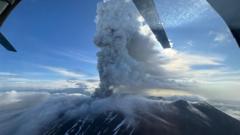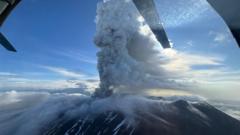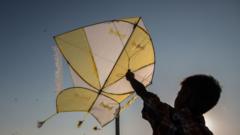Mount Lewotobi Laki-Laki erupted, producing significant ash clouds and prompting evacuations, while residents prepare for potential mud flows.
Indonesia Raises Alarm as Mount Lewotobi Laki-Laki Erupts

Indonesia Raises Alarm as Mount Lewotobi Laki-Laki Erupts
A massive ash cloud from one of Indonesia's most active volcanoes has triggered the highest alert level.
Mount Lewotobi Laki-Laki, one of Indonesia's most active volcanoes, erupted dramatically on Tuesday, sending an ash cloud soaring 11 kilometers into the sky, leading officials to issue the country's highest alert level. The eruption occurred at 17:35 local time (10:35 BST) and primarily affected the tourist island of Flores.
Authorities have established a 7-kilometer exclusion zone around the volcano, which stands at 1,584 meters (approximately one mile) high. Fortunately, there have been no immediate reports of damage or injuries following the eruption.
The head of Indonesia's volcanology agency, Muhammad Wafid, has urged locals to refrain from any activities within the exclusion area while warning of potential lahar floods—a dangerous mixture of volcanic debris and water—should heavy rains occur. Residents living in nearby areas have been instructed to wear face masks to protect against ash fallout.
In response to the turmoil, the National Disaster Mitigation Agency reported that at least one village had been evacuated as precautionary measures, with ash rain affecting several communities outside the exclusion zone. Local officials continue to monitor the situation as tremors indicate ongoing volcanic activity in the region.
This current eruption comes after a series of eruptions in November last year, resulting in nine fatalities and displacing thousands. The Lewotobi Laki-Laki volcano last erupted in May, prompting similar warnings from authorities. The twin-peaked volcano, named after "man" in Indonesian, is accompanied by the taller but less active Mount Perempuan, which translates to "woman."





















